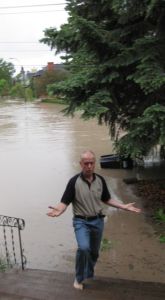My brother Rory lives in Calgary, Alberta. Last night he emailed photos of his flooded home and the surrounding streets. It is nothing short of a disaster. His home is ruined. His belongings are destroyed, musical instruments, books, photographs, all personal and highly sentimental.
This morning I switched on Sky News to see the footage. They are reporting that 75 thousand homes have been evacuated. Four people may have died. The news report dedicated about 5 minutes to the story. That is no small allocation of time for a story in a foreign country.
But then Canadians speak English. They are part of the British Commonwealth. They are a predominantly anglo-saxon protestant society, and this is especially true of Western Canada and Alberta. So the British and Irish audience of Sky News can readily empathise with the flooded Albertans. We have little aesthetic or psychic distance from these people. They are like us.
Also on the news report this morning is a one line spoken report of 550 deaths in Northern India due to the early arrival of the Monsoons. Stop press! they have updated it to two lines and added a shot of a mule being pulled to safety across a raging river.
Well, there is a lot of psychic distance between us and those folk in India. They don’t speak our language. They don’t look like us. Let’s face it, we really don’t want to look at dead poor people. Which is why the newsroom selected the mule footage. We can empathise with a poor frightened innocent animal better than we can empathise with the 550 dead and their bereaved families.
Now it would be very easy to blame the person in the newsroom over in Sky and rant about how they devalue the lives of those Indian people. But that would be missing the point. Sky news broadcasts for ratings. They know we want to see Calgary and that we do not want to see India. They understand a lot about psychic distance.
The question is, what does it say about us as people? We have concern for those we identify as “us” or “of us”. When we identify people as “other” or “them” a different set of dynamics comes into play. They are not us. They do not behave, look, sound or smell like us. In many cases this engenders suspicion and even fear. We want to set up barriers between ourselves and those people who are not us. We do not want to empathise with their deaths, because at a certain level the world will be a more secure place if there are not so many of those “other” people in it.
By contrast, to those facing an exogamous impulse there is an attraction to the “other”. In simple terms exogamy stimulates tribe members from mating within the tribe and broadens the gene pool of a race. This is why gap year students are motivated to travel long distances from home and engage in courtship with strange people. But even then gap year students tend to have their fling with other gap year students, or with other people from developed western nations. Even when we are most open to those from “other” cultures we have limits on how far we will comfortably stray in terms of psychic distance.
I feel sorry for my brother and the loss of his personal effects. But I am glad I am not an Indian living in London who has heard that my brother is dead and his home has washed down a river valley. I am glad that my brother is alive and safe and that his greatest worry is that the insurance company won’t pay. And Rory, if you read this, stop wading around in that water, you will contract giardiasis. That water is full of Beaver crap!
The Listeners; by Walter de la Mare
“Is there anybody there?” said the Traveller,
Knocking on the moonlit door;
And his horse in the silence champed the grass
Of the forest’s ferny floor;
And a bird flew up out of the turret,
Above the Traveller’s head:
And he smote upon the door again a second time;
“Is there anybody there?” he said.
But no one descended to the Traveller;
No head from the leaf-fringed sill
Leaned over and looked into his grey eyes,
Where he stood perplexed and still.
But only a host of phantom listeners
That dwelt in the lone house then
Stood listening in the quiet of the moonlight
To that voice from the world of men:
Stood thronging the faint moonbeams on the dark stair,
That goes down to the empty hall,
Hearkening in an air stirred and shaken
By the lonely Traveller’s call.
And he felt in his heart their strangeness,
Their stillness answering his cry,
While his horse moved, cropping the dark turf,
‘Neath the starred and leafy sky;
For he suddenly smote on the door, even
Louder, and lifted his head:–
“Tell them I came, and no one answered,
That I kept my word,” he said.
Never the least stir made the listeners,
Though every word he spake
Fell echoing through the shadowiness of the still house
From the one man left awake:
Ay, they heard his foot upon the stirrup,
And the sound of iron on stone,
And how the silence surged softly backward,
When the plunging hoofs were gone.
